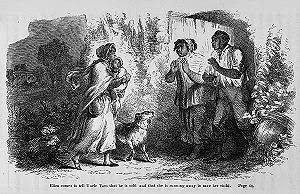Uncle Tom's Cabin

The book opened people's eyes to the horrors of slavery, and set off a wave of fierce protests, drawing people to join the abolitionist cause. Eventually the blatant evil was brought to an end. And all in no small measure because a woman of no imposing frame made up her mind to write about systematic injustice in the USA of her own day.
Two weeks ago I finished reading 'Uncle Tom's Cabin' to my eight-year-old son. This was the second time I encountered the fictional character of Uncle Tom, the sturdy, saintly and suffering slave - a native of Kentucky in the mid 1840s. Tom's life is littered with bitter struggles and tragedies. In between periods of relative calm and brief moments of domestic happiness, he is brutally and indiscriminately torn from the people he loves and cares for. As if he were an item and not a man, he is sold repeatedly to various slave owners, some savage, some civilized.
Forgiving his enemies
The astonishing thing about Tom is his seemingly boundless capacity for forgiveness, especially towards the single most nefarious character of the book, the last of his string of massas, one Legree. Legree is the consummate brute, bereft of all empathy and humanity, and with a personality so ghastly and hideous it makes you wonder if such a person ever could have existed.
Legree's temperament is explosive, and since he has zero tolerance for even the minutest act of defiance and insolence on the part of his slaves, he does not miss a single opportunity to apply physical violence whenever he sees fit. Legree is particularly incensed by Tom's dignified self-control and gentle responses in the face of physical and verbal abuse - the only dialects known to this Southern slave lord.
Legree even detests Tom for not hating him back, and so he attempts to drag this tried saint down to his own level of degradation and animal savagery. But he fails, as every lash of the whip, every wound upon Tom's back, just strengthens the old slave's resolve to never hit back in anger. Just like Christ, he forgives his tormentor even while slowly drifting through death's door to a heaven he craves passionately.
The power in a book
'Uncle Tom's Cabin' is partially flawed in many ways, yet it still exerts its undying pull on people like my own son. Talking to his mother one day, he quietly revealed his disgust at having the same colour of skin as this tyrant Legree. I guess that's just what many readers felt back in the late 19'th century when Mrs. Beecher Stowe's work was originally publised.
People who are taught that man's inherent Goid-given value prohibits society or individuals from causing traumas in other people's lives, will probably all react more or less the same way as my son did. And therein lies the beauty of true humanity: learning about the injustices that befall other people, we some times choose to be emotionally and intellectually stirred to strive to put an end to that which is destroying our brother.
Harriet Beecher Stowe's contribution towards ending slavery in America is recognized in the USA even today. And in the Oval Office sits a man who owes much to this lady of liberating letters.


Kommentarer
Legg inn en kommentar